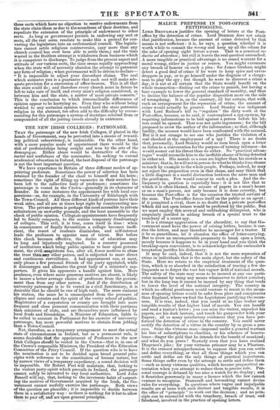THE NEW IRISH COLLEGES : PATRONAGE.
THAT the patronage of the new Irish Colleges, if placed in the hands of Government, may be perverted into a means of reward- ing political subserviency, is undeniable. On the other hand, with a more popular mode of appointment there would be the risk of professorships being sought and won by the arts of the demagogue. Either abuse would be destructive of the cha- racter and usefulness of the seminaries. In seeking to extend academical education in Ireland, the best disposal of the patronage is not the least important question. We have experience in Britain of three different modes of ap- pointing professors. Sometimes the power of selection has been retained by the founder of the chair to himself and his heirs ; sometimes the right of filling up vacancies in their number has been left to the collective body of professors ; sometimes the patronage is vested in the Crown—generally in its character of founder. In some instances the appointment lies with lobal cor- porations—as, for example, in the University of Edinburgh with the Town-Couneil. All these different kinds of patrons have their weak sides, and all are at times kept right by counteracting mo- tives. The private patron is perhaps the most accessible to private solicitations on unworthy grounds, and the least amenable to the check of public opinion. Collegiate appointments have frequently led to family compacts, to the serious temporary disadvantage of colleges. This evil, it is true, cures itself in time : when in consequence of family favouritism a college becomes ineffi- cient, the resort of students diminishes, and self-interest leads the professors to appoint men of talent. But before this check becomes effective, the duties of education may be long and injuriously neglected. In a country possessed of institutions which bring public opinion to bear upon govern- ment, the civilinagistrate has, after all, fewer motives to abuse the trust thanary other patron, and is subjected to more direct and continuous surveillance. A bad appointment can, at most, only please a few personal friends of the party appointed, while it discourages and alienates the great body of a minister's sup- porters. It gives his opponents a handle against him. Mere prudence, even where more generous motives are absent, is likely to insure a better average choice of professors from the govern- ment than from any other patron. And if the distribution of university patronage is to be vested in a civil functionary, it is desirable that he should be one of high rank. The more eminent his station, the more he is emancipated from the pressure of cliques and coteries and the spirit of the vestry school of politics. Magistrates of a corporation or county are brought into more frequent and close personal communication with their partisans than ministers of state, and are themselves more influenced by local feuds and friendships. A Minister of Education, liable to be called to account in Parliament for his exercise of university patronage, has more powerful motives to abstain from jobbing than a Town-Council.
Not, therefore, as a temporary arrangement to meet the actual state of circumstances in Ireland, but as a permanent rule, it seems desirable that the appointment of Professors to the new Irish Colleges should be vested in the Crown—that is, in one of the Crown's responsible Ministers, the President of the Education Committee of the Privy Council. If the question who is to have the nomination is not to be decided upon broad general prin- ciples with reference to the constitution of human nature, but by narrow views of a temporary expediency, a sound decision will be impossible. Sir Robert Peel will maintain, that, looking to the violent party-spirit which prevails in Ireland, the patronage cannot safely be intrusted to any local authorities. Lord John Russell will say, that, looking to the inveterate habit of suspect- ing the motives of Government acquired by the Irish, the Go- vernment cannot usefully exercise the patronage. Both views of the question are plausible ; it is impossible to decide between them in a satisfactory way : so there is nothing for it but to allow them to pair off, and act upon general principles.


























 Previous page
Previous page